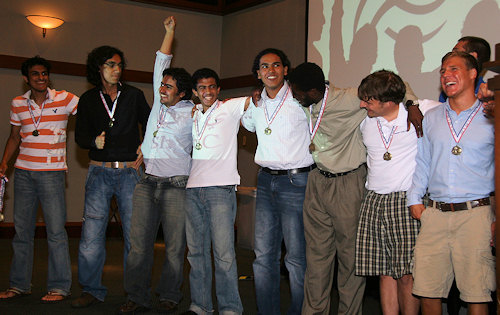 |
| UD peer mentors celebrate with students from Saudi Arabia at the end of a successful four-week sumer bridge program. |
Pioneer program bridges gap for Saudi undergrads
When Brent McCracken saw the email about a summer job, he didn’t hesitate.
Wanted: Mentors for international students. Must be strong in math,
chemistry and physics and open to cultural differences.
He would get to learn about other cultures and help people.
“This is something I would do for free,” he thought.
The senior mechanical engineering major was one of 15 top students chosen to live and study for four weeks this past summer with 40 students from Saudi Arabia. For McCracken, it was a bit like doing a study abroad program and getting paid for it. No passport required.
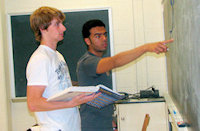 |
| Hassan Alsada (right) solves a chemistry problem using Hess' Law with peer mentor Chris Leiminger (Che '10) |
He couldn’t believe his luck.
In fact, what represented a dream summer job for McCracken and his peers was, for the Saudi student participants, part of a much larger opportunity–– a five-year scholarship to study engineering at an American university, followed by a job with Saudi Basic Industries Corporation (SABIC), one of the world’s leading manufacturers of chemicals, fertilizers, plastic and metals.
Selected from among the brightest high school graduates in Saudi Arabia, these students had already jumped several academic hurdles: SATs, a year of English study in one of nine intensive English programs around the country, including UD’s English Language Institute, and passing the TOEFL. Wouldn’t all these guarantee their success as undergraduates?
Previous experience had shown otherwise. The first wave of SABIC-sponsored students in 2007 had struggled at American universities, and for many, their performance had been disappointing. They had shown gaps in math, chemistry and physics, as well as limited creative problem solving and study skills. These needs led SABIC to ask UD’s English Language Institute to design a preacademic summer institute.
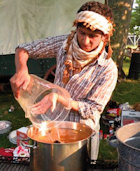 |
| Sharing traditional food |
“Undergraduate education is not simply an intellectual endeavor, but also a highly contextualized cultural phenomenon. It’s a system of unwritten rules and expectations requiring specific strategies, skills and behaviors for success,” said ELI director Dr. Scott Stevens, who proposed the experiential summer bridge course.
“Some of these cultural and meta-cognitive skills can be overtly taught, but others are best internalized through modeling and interaction.”
That’s where the American students came in. Their integration with Saudis––both in the classroom and in the dorm room––would be the key to bridging that academic cultural gap. As class peers, study partners and roommates, American students would model the behavior that leads to academic success in the United States.
In consultation with the undergraduate assistant dean of engineering, Dr. Dan Boulot, SABIC student program supervisor, Mr. Saleh Fawaz, and current Saudi Arabian undergraduate engineering students, the English Language Institute fashioned a four-part program and hired Brett Tomashek to coordinate it.
Mornings consisted of three hours of pre-calculus or calculus, chemistry and physics. Each afternoon, small groups of students, with American classmates as peer instructors, spent two and a half hours reviewing the content of the morning lectures. This was followed by an hour of orientation for Saudi students, led by the Office of Academic Enrichment or the Counseling Center. Evenings were for homework, with peer mentor roommates available in the Christiana Towers dorms to help.
“The first day we had 20 questions in math, 34 problems in chemistry and seven pages to read for physics,” said Abdullah Baaqeel, currently a freshman at UD in mechanical engineering. The daily physics assignment subsequently increased to 20 pages a day.
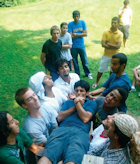 |
| Building trust through free-fall activity |
“Back home we never did this,” he said.
“Sometimes I’m up till 2 a.m. helping them with their homework,” said mentor Claudy Joinville, a third year civil engineering student. “It’s very intense.”
As peer instructor in the afternoon sessions, Joinville’s area of responsibility was physics. Having learned English as a second language himself while attending Laurel High School in southern Delaware, the permanent resident from Haiti could sense where his Saudi classmates were misunderstanding concepts in the discussion-based physics class.
“The main problem is the language barrier, the terminology,” he said. “Words like ‘radiation.’ Or they might not understand when the discussion is hypothetical.”
The math class was designed to “fill in any gaps” the Saudi students might have. Participants appreciated the needed review.
“We’ve been doing English for a year. My last math class was in high school, a year ago,” said Baaqeel. “It’s like a refresher course.”
Again, terminology was a stumbling block. “It’s hard to discuss math.We need to examine every word, like ‘denominator,’ in the dictionary,” said Ibrahim Al Mulhim, who was slated to study electrical engineering at Penn State.
In addition, everything in Arabic, including equations and graphs, is written from right to left. And there’s a different notation system in English, including symbols like ε, ϕ and θ for special functions––truly “Greek to them” before the summer course.
Chemistry provided a different set of challenges. The system of quizzes––rare in Saudi Arabia––took getting used to, as did the homework.
“Here, it’s more difficult. You have to do research. You have to figure it out. In Saudi Arabia the system is memorization. Here you have to understand the stuff, which I love,” said Al Mulhim. He also appreciated a different type of relationship with the professor.
“You can disagree with your professor easily,” he said. “In Saudi Arabia, you have to show respect. You can’t disagree even if the professor is wrong. You can be more creative here.”
In the afternoon study sessions, said McCracken, “The peer mentors try to simulate what we’d do as Americans in a study group.”
In addition, McCracken took his whole group to the chemistry professor’s office to discuss the results of a test. “I wanted to show them that professors are approachable,” he said.
One area, however, participants quickly learned, was not open to discussion. If you missed a quiz, that was a zero. No negotiation. Grades were reported regularly to SABIC and the group with the highest grades on quizzes and tests each week received free headbands and sports shirts. This created some peer pressure to do the work.
“We try to help each other so we all get good grades,” said Baaqeel.
Besides the academic support and the role modeling, having Americans as classmates and roommates provided invaluable insights into the culture.
“We know how to behave with the Americans and what pisses them off,” said Al Mulhim.
Participants quickly learned that racial jokes, acceptable in Saudi Arabia, were off limits. And they found out how far they could go with teasing.
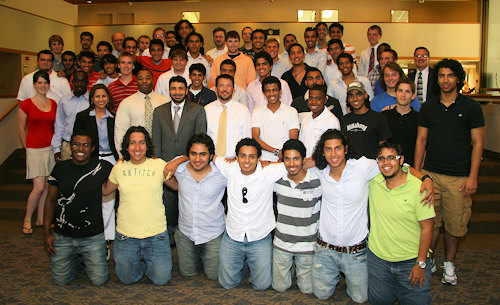 |
| Sabic participants at graduation ceremony |
“When they tell you to stop,” he said, “you need to stop.”
Traveling with an American peer to the New Jersey shore provided unintended lessons.When an officer pulls you over for a traffic violation, Al Mulhim learned, “you should stay in the car and put your hands on the wheel.”
McCracken also relished learning about Saudi culture.
“There’s a group mentality.When someone gets the answer to a problem, they’ll break out into applause. It’s great to see how they support their friends.”
He rattled off a list of surprising and enjoyable experiences.
“All the trips were great––the Blue Rocks game where [the Saudi students] cheered so loud, the dance parties at the beach, the hayride when they were clapping and singing. They’re really genuinely nice and fun to be around.”
The most memorable event for both McCracken and Joinville was the weekend camping on a ranch in Maryland, when the Saudi students managed to barbecue a whole goat. “We just sat on the ground and ate it,” said McCracken. “It was so amazing.”
By the end of four weeks, the two groups were feeling close enough to bridge other cultural divides. “They knew we were shy with girls,” said Al Mulhim. “So they told their girlfriends, and they tried to break down the walls. The experience with the American students, in my opinion, was more important than what we learned in class.”
“After living, playing soccer and studying with [the Saudi students],” said McCracken, “you realize they’re just like us. Now we’re all buddies.”
“The Americans––they’re not just TAs,” echoed Baaqeel. “They’re friends.” • BM
Editor’s note: Of the 40 Saudi participants, five matriculated at the University of Delaware. The others are now studying at the following universities: Colorado, Houston, Maryland, Minnesota, Ohio, Penn State, Texas, Vanderbilt and Washington. The ELI would like to thank Dr. Geoff Sametz of the chemistry department, Dr. Norbert Mulders of the physics department and Mr. Tom Koliss, advanced placement mathematics teacher, Newark High School, for their participation in the program.